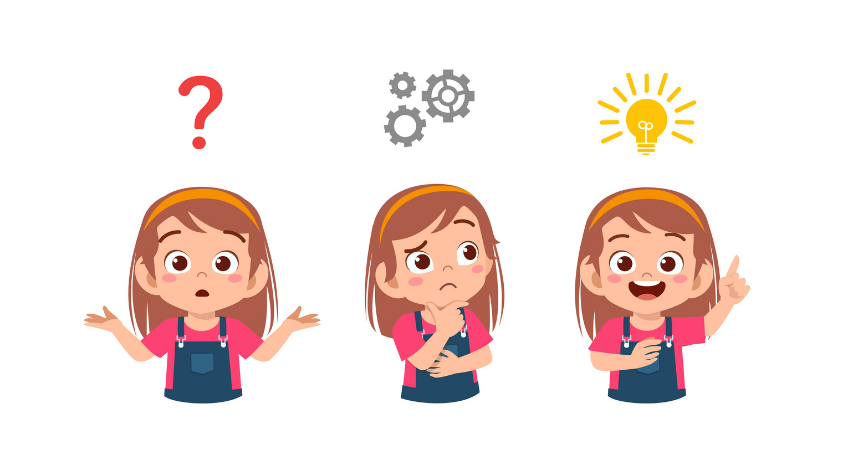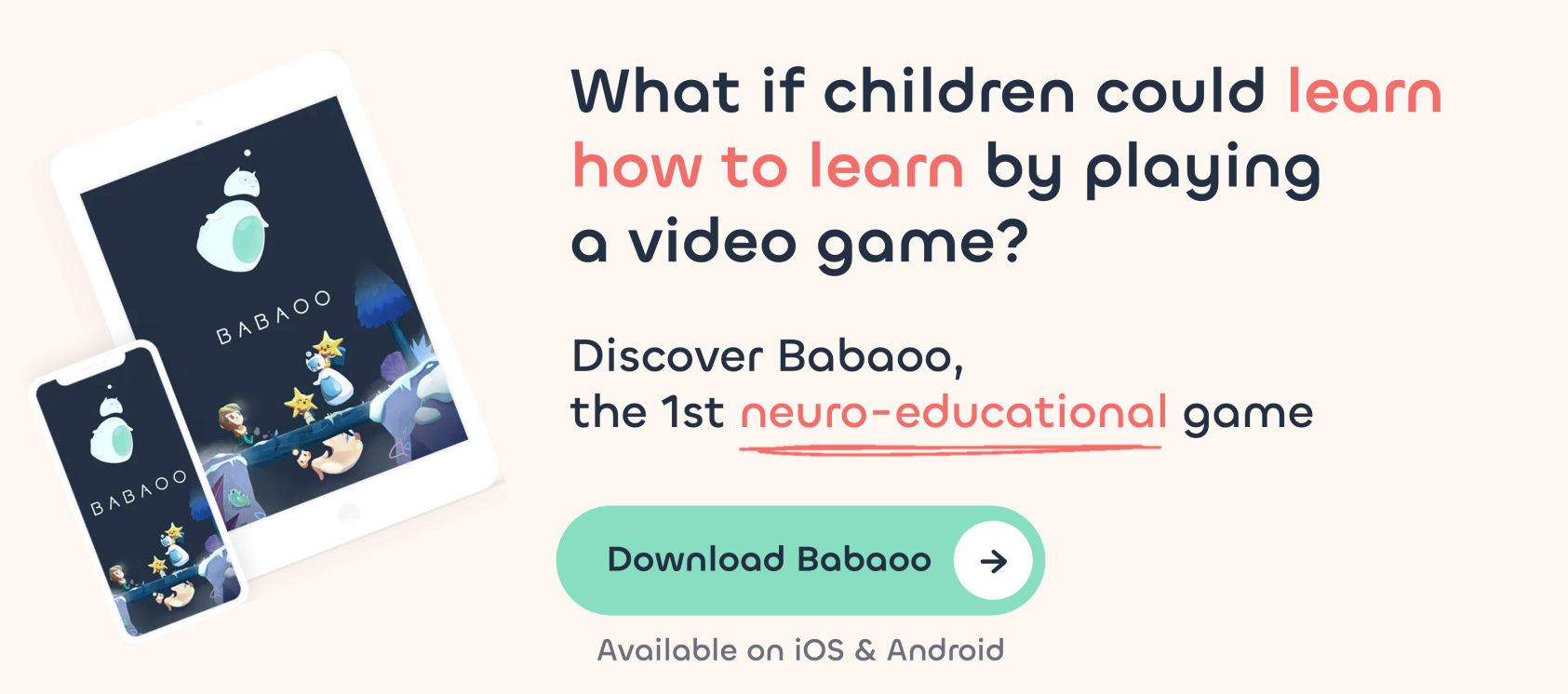
What is metacognition exactly?

What is metacognition?
Imagine: your boss gives you a task for which you don’t feel competent and your stomach is in knots. Or you have to speak in public and your heart is racing… Stage fright! 😬
- This is where your “little inner voice” comes in: “Calm down. Breathe. How can I best prepare for this ordeal? How can I stay zen?“
- And then, a hint of optimism surfaces:“Even if I don’t know exactly how to go about it, I have skills I can mobilise!“
In a flash, you assess, plan, and anticipate. In fact, you metacogitate! 💬
Metacognition: definition
Metacognition is our ability, when faced with a task to accomplish or a problem to solve, to step back and analyse the situation, and pay attention to what’s going on in our heads.
Automatically, we call on our feelings, our past experiences, our knowledge… to develop a strategy that will enable us to achieve our goal. 🎯
This process of “reflecting on the way we think” isn’t just useful for us adults. It also plays a crucial role in the development of our children, helping them to understand and navigate an ever-changing world. Imagine if your little protégé could develop this same skill to tackle life’s challenges, whether cognitive, academic, social or emotional.
Metacognition at the service of learning
Metacognition allows us (or rather: allows our brains 🧠) to develop strategies for adapting to any situation. Whether it’s overcoming a difficulty or shining where they already excel, your child is never alone! His “little inner voice” is there, adjusting course in real time to help him navigate through the ups and downs of learning.
If he’s learning to swim, he might say to himself, “Concentrate on every movement, just like we did in the shallow end.” And if he’s asked to write a poem that’s even more brilliant than the last one, his little voice might exclaim: “Poetry is my field, too easy!”.
The brain is malleable, it’s constantly evolving, and we can learn to guide it, and therefore to metacogitate. And the good news is that children can be taught to metacogitate from an early age! 👶
Metacognition is paying attention to what’s going on in our heads while we’re doing something.
The key to autonomy
Metacognition is a bit like an interactive instruction manual for our brain. 🧠 Your child can use it every time he’s faced with a task that isn’t (yet) automatic. Of course, they no longer need an instruction manual to walk. But as soon as they need to learn something new or adjust a technique that hasn’t worked well in the past, metacognition comes into play… whether it’s tying their shoes, reading, or swimming!
Better still: metacognition can also improve performance in many areas. Thanks to metacognition, your child learns to develop and optimise learning strategies that they will use throughout their lives. In short, metacognition is “learning how to learn“. Yes, even if you sometimes want him to stay small, your little one is going to become more and more independent. He’s growing up! 👏
“Thanks to metacognition, children discover that they have a superpower: they can act on their brain and pull the strings of their own functioning!” (Joëlle Proust, French philosopher and researcher specialising in cognitive philosophy).
Metacogitation can be learned… in 3 steps!
Emeritus psychologist and reference author in the field of neuroeducation, Pierre Paul Gagné has been emphasising the importance of metacognition in promoting learning in children for years. The book he co-authored “Apprendre… Une question de Stratégies” is essential reading on the subject.
Teaching a child to metacogitate means making them aware of what goes on in their head when they do (or are going to do) something. To do this, ask them: how are you doing this, and why? This will encourage him to listen to his little inner voice and verbalise his strategy.
✏ Note: questioning a child means getting them involved.
You’ve got a furious urge to try out the method at home? Great! To help you (you, but especially your little one), here’s how to metacogitate in 3 steps. ⤵
1. Before starting the task:
Propose to your child to define a clear objective. Let’s say “draw the cat”. 🐈 Why? How? With what materials? By asking him what’s going on in his head, you encourage him to ask himself questions and prepare his strategy (scenario).
But metacognition doesn’t stop there! What your child says to himself even before he starts drawing will greatly influence his approach. If they feel competent, they might think: “Drawing a cat is too easy! But if he doubts his skills, he might say to himself, “Oh no, that’s too difficult for me!”.
These thoughts, and the emotions that go with them, such as stress or confidence, will play a crucial role at every stage of the task. They will influence not only his initial actions, but also how he adjusts his approach if things don’t go to plan.
So ask him questions that help him become aware of this inner dialogue and the associated emotions. For example, “How do you feel about drawing a cat?” or “What do you say to yourself before you start?”.
2. While carrying out the task:
If he encounters difficulties (for example, if he thinks the tail is “ugly”), he may tend to get discouraged. Encourage him (again) to question himself. Is it serious? How could he correct his drawing?
Verbalising the questions will enable him to adjust his strategy along the way.
3. After completing the task:
Admire his masterpiece with him and ask him if he is happy with it. If not, how could he do it next time? What has he learned from this drawing? Ask him if the strategy he used to draw his cat could be applied to other tasks. Then encourage them to practise. It’s by practising that his brain will eventually integrate the learning.
It is essential that your child puts words to each stage, each feeling. By doing this (and not drawing the cat for him), he will integrate his own scenario and, later, will be able to repeat it. Little by little, learning becomes automatic, and your child becomes autonomous.
Teaching your child to metacogitate is giving them a wonderful gift: the gift of understanding their own functioning! 🎁
✏ Note: the adult no longer needs to think to tie his shoelaces. Children, on the other hand, need to follow a strategy (a story, a song…) to remember how to do it. So they need to metacogitate. First out loud, then in their head. With time, and lots of practice, he’ll soon do it automatically. That’s what we call transfer . 💫
A positive impact at home and at school
As we’ve just seen, metacognition will help children to understand how they work in order to develop their skills and gain autonomy.
Metacognition will also have a very positive impact on their radiance and social interactions, both at school and at home. Why? Because learning to metacogitate will enable them to develop their sense of competence, and therefore their self-confidence.
Faced with new learning, he’ll remember that this isn’t the first time he’s experienced something unknown, and he’ll say to himself, “I can do it!”. And a child with confidence is a child who thrives.
✏ Note: Carol Dweck, American Psychologist and Professor of Psychology at Stanford University has developed a theory that wonderfully explains this positive perspective on learning: ‘The Power of Yet’. In other words, “it’s not that I don’t know how to do it, it’s that I don’t YET know how to do it”. This idea suggests that with time and effort, everyone can learn and improve.
Babaoo recap’
- Without realising it, we metacogitate whenever we have a task to perform that is not automatic. So daily and very often. But we can also call on this skill proactively when we want to solve a problem or learn something new.
- For a child (who has so much to learn! ), this is a magic key to their abilities, learning and behaviour. Bref, a superpower that will serve him throughout his life! 💪
We see you coming… Wondering who wins between Superman and Metacogitman? 🦸
We put the question (and plenty of others) to Alexandra Volckaert, Ph.D. in Psychology specialising in Neuropsychology and Head of Research at Babaoo. Find out more about her interview in a forthcoming article. 🎬
You may also be interested in these articles



